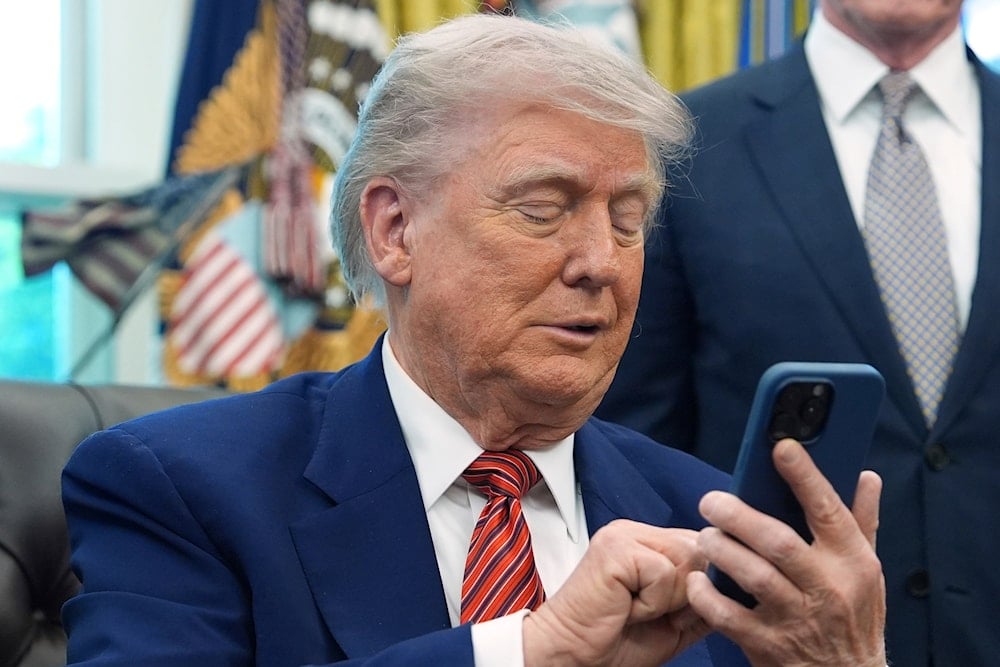Trump making Netanyahu nervous amid policy shifts: The Atlantic
Donald Trump’s latest Middle East tour excluded "Israel", underscoring a broader policy shift that has included Iran nuclear talks, Syria sanctions relief, and a ceasefire with Yemen.
-

US President Donald Trump silences his mobile phone, which rang two times as he was speaking to reporters after signing executive orders regarding nuclear energy in the Oval Office of the White House, on May 23, 2025, in Washington. (AP Photo/Evan Vucci)
Former US President Donald Trump’s recent tour of the Middle East included visits to Saudi Arabia, the United Arab Emirates, and Qatar, but conspicuously excluded "Israel," a move that drew both attention and concern, The Atlantic reported on Sunday. When asked, Trump denied it was a snub, claiming the trip was ultimately "good for Israel," as he worked to reintroduce normalization agreements between Arab states and Tel Aviv.
The visit, part of a broader Trump Middle East policy shift, marked a new chapter in Washington’s regional approach, one that no longer places "Israel’s" priorities at the center.
According to The Atlantic, Trump’s policy moves have alarmed the Israeli leadership, particularly concerning Iran, while the US has resumed indirect negotiations over Tehran’s nuclear program, an issue that "Israel" sees as existential.
That said, even the possibility of eased sanctions has triggered anxiety in Tel Aviv, where Prime Minister Benjamin Netanyahu has long opposed any communication with the Islamic Republic.
Tensions have also flared over Gaza; as "Israel" intensified its military assault on the Strip, Trump publicly called for a ceasefire, according to The Atlantic, adding that the call for de-escalation has fueled fears in "Israel" that US support for the war may be weakening.
Adding to Israeli concerns, the Trump administration recently negotiated the release of Israeli-American Edan Alexander without involving Israeli authorities. Critics argue that this sidelined "Israel" diplomatically and drew further attention to Netanyahu’s failure to secure the release of other captives.
Syria sanctions lifted despite Israeli concerns
On another note, Trump’s visit to Saudi Arabia also included a landmark meeting with Ahmad al-Sharaa, the new Syrian head of state, marking the first US presidential contact with Syrian leadership in over two decades.
He announced the lifting of sanctions on Damascus and praised al-Sharaa as “pretty amazing.”
For "Israel", this move is deeply problematic, according to The Atlantic. Tel Aviv sees the Syrian leader, who has former ties to al-Qaeda, as a regional threat. Moreover, "Israel" has long pushed Washington to maintain sanctions on Syria while continuing its own military operations and support for Syrian Druze factions near the occupied Golan frontier.
Another sharp divergence emerged over Yemen. After the October 7 operation, Ansar Allah began launching missiles toward "Israel" and engaging US naval vessels in the Red Sea. While the US responded with military strikes, earning praise from "Israel", the Trump administration soon shifted course.
Earlier this month, Washington secured a US-Yemeni ceasefire without "Israel’s" involvement. The agreement was announced just two days after a missile from Yemen struck "Israel’s" main airport, and attacks have continued since. Tel Aviv was left out of the diplomatic process, reinforcing perceptions of growing US indifference to its security concerns.
A broader retreat from assertive US regional role
According to The Atlantic, these developments are part of a broader trend: the United States under Trump is stepping back from the assertive regional role it traditionally played, one that "Israel" has relied upon for deterrence, military support, and strategic backing.
Under the previous administration of Joe Biden, the US maintained a robust military presence and provided extensive support for Israeli attacks on Gaza, even while calling for humanitarian considerations. Trump’s current cabinet, however, includes officials wary of long-term foreign commitments, and US troop levels in Syria are being reduced.
This Trump Middle East policy shift represents a new paradigm, one in which Washington is more willing to recalibrate its alliances and reduce its interventionist footprint, The Atlantic wrote.
It added that "Israel" is not losing its ally, but it may soon find itself more alone in a reshaped Middle East.

 4 Min Read
4 Min Read








